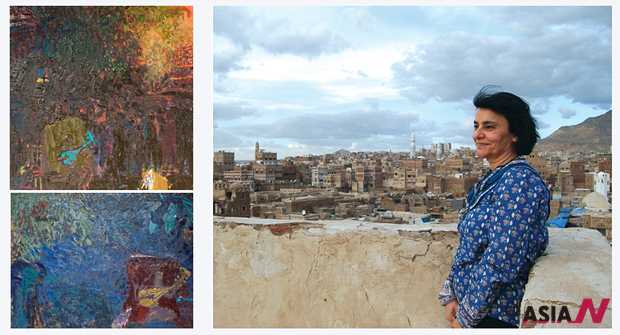Lebanese painter looks for lost Utopia

Alternative worlds: the quiet revolution, the implicit discourse in ugly worlds which artist Fatima Alhajj fights in a musical/artistic discourse. Here begins the world of artist Fatima Alhajj. Alhajj’s works represent a protest against a manufactured, moulded, rough, rigid, unkind and violent world, because they look for the opposite of all that in a non-monotonous symphony.
*Editor’s note: This is the third installment of six-part stories about six Arab women artists devoting themselves to creating different style of art and innovating their methods of expression for “revolutionary” change.
Artist Fatima Alhajj stands in the heart of a triangle whose three academic sides are the universities of Beirut, Moscow and Paris, where she specialized in art and became a professor of. But as she addresses painting and us she sets aside this triangle, which she masters, to carry the message of joy, rich Lebanese nature, to the world, leaving the serious academic world to the wider, more spontaneous world of colours. Isn’t she the one who said: “I’m Fatima Alhajj, the child artist who embodies innocence and transparency?”
Her works represent a protest against a manufactured, moulded, rough, rigid, unkind and violent world because they look for the opposite of all that in a non-monotonous, original symphony. Though one them, approaches are different, as the eye dreams, and the brush and colours demonstrate this dream which is unframed (her works are frameless) because she wants spontaneous, free nature unfettered by arbitrary lines.
After a hard day lost in traffic noise and in front of the computer keyboard and tiring because of people’s rashness, sheer madness and rough behaviour all we look for is a virgin oasis and land unspoilt by cement. Here begins the world of Fatima Alhaji with its green boundaries.
It is a message calling on us to preserve what is left of our humanity and natural disposition before being corrupted by the hidden and stated betrayal of mechanization and before we ourselves become machines. That’s why her works look like a prescription for cure and regaining our humanity or part of it, return to virgin nature, Mother earth, before further abuse of!
Alhajj lives among gardens of self and spirit, a world of imagination by colour in search of lost utopian worlds, in consolidation of scenes engraved on the memory of a lover of nature, or as she keeps saying: a message of protest from a revolutionary nature.
Her works reflect her quiet nature, but when she shares in a conference or a discussion of an issue of art her quiet turns into a great uproar because she strenuously defends her views against consumerist tendencies.
Comparing past and present she angrily remembers how we were real and influenced the entire world and humanity drew inspiration from our Islamic civilization in the areas of medicine, philosophy, science and arts, but prohibitions and bans are equivalent to the yoke of occupation.
I agree with the eminent artist, for if we want to regain our real identity, originality and humanity from the military – foreign and national alike – who have one aim: to keep us ignorant. This requires revolutionaries who stand against humiliation and submission, repeating what Fatima says; “When we stop waiting for others’ recognition of us, this is he first step towards, rather than behind, others, with our current, rather than past, characters, as if Pharaohs, Copts and Muslims were the living; the Arabs the dead.”
You can hardly recognize humans in her works because they are part of nature, as if melted in it. They are green beings living in a colour dream, playing a musical note on shades of colour, as if memories were attracted to those natural places, as if transparent roaming clouds of people were present but absent. Why not? People today are busy possessing electronic houses, concrete gardens, now that man has just become a microchip in a large hi-tech electronic machine. When people return to their humanity they will stay in the gardens of self and spirit and play their natural tunes to which seen and unseen creatures dance.
During painting, Fatima Alhajj flies outside her academic triangle and lands on a non-acute-angled triangle, unframed; its ingredients are nature, music and man. That’s why her revolution carries colour icons which reformulate a world we have lost and has almost disappeared, through recreating their hanging gardens in memory, spirit and self together.













































































Pingback: 아랍 예술가 파티마 ‘사라진 유토피아를 찾아’ « All « 아시아엔
This is such a great resource that you are giving and you present it apart for absolutely free. I love finding websites that have an understanding of the importance of providing a excellent aid for cost-free. It might be the old what all over happens around habit …
a brave and sharp article that opens up very clrlaey and in a simple way the cancerous source of Israeli culture.This voice is coming from an outsider perspective, from a person that has experienced diverse cultures, who is able to view deeply and sharply into the source and meaning of things.I wish that this article will help to pave the way for a brave, open and transparent discussion and for that all participants need to put aside, or “let go” their political ambitions in the field of culture.The space of culture is multi-dimensional and there is an equall space for all.